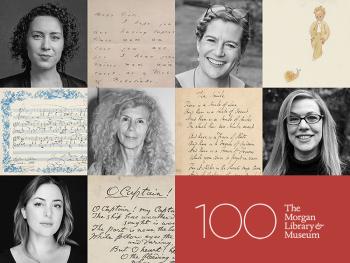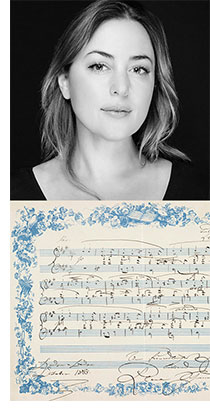Plan your visit. 225 Madison Avenue at 36th Street, New York, NY 10016.
Plan your visit. 225 Madison Avenue at 36th Street, New York, NY 10016.
Centennial Conversations | Maria Popova & Paola Prestini: Creativity in the Margins of Culture
A conversation with Maria Popova and composer Paola Prestini, lensed through the music manuscripts of Clara Schumann and others. New York-based composer-keyboardist Forrest Eimold will play selections of work discussed in the conversation.
"To celebrate the centennial of the Morgan Library & Museum–one of my favorite cultural institutions, stewarding some of the most influential works in the history of creative culture–I have chosen several items from the collection that I especially love to serve as springboards for larger conversations about art and life with some of the most interesting and creative people I know. We will be investigating questions like the nature of time and self, the art of observation and the art of vision, the relationship between memory and self-forgetfulness in creative work, and the power of being an outsider, lensed through Whitman and Dickinson, The Little Prince and Alice in Wonderland, the invisible women in the margins of classical music and the hidden philosophy in the margins of children's books."
– Maria Popova, writer, thinker, and creator of The Marginalian
Composer Paola Prestini has cultivated a uniquely expansive and humanistic musical voice, through pieces that transcend genre and discipline, and projects whose global impact reverberates beyond the walls of the concert hall. Far more than just notes on a page, Prestini's works give voice to those whom society has silenced, and offer a platform for the causes that are most vital to us all. Prestini has been named of the Top 35 Female Composers in Classical Music by the Washington Post, one of the top 100 Composers in the World by National Public Radio, and one of the Top 30 Professionals of the Year by Musical America. As Co-Founder of National Sawdust, she has collaborated with luminaries like poet Robin Coste Lewis, visual artists Julie Mehretu and Nick Cave, and musical legends David Byrne, Philip Glass and Renee Fleming, and her works have been performed throughout the world with leading institutions like the New York Philharmonic, Los Angeles Opera, Dallas Opera, London's Barbican Center, Mexico's Bellas Artes, and many more.
Maria Popova thinks and writes about our search for meaning—sometimes through science and philosophy, sometimes through poetry and children's books, always through the lens of wonder. She is the creator of The Marginalian (born in 2006 under the name Brain Pickings), which is included in the Library of Congress permanent digital archive of culturally valuable materials, author of Figuring, and maker of the live show The Universe in Verse—a charitable celebration of the wonder of reality through stories of science winged with poetry — which is now also a book.
New York-based composer-keyboardist Forrest Eimold (b. 1999) has been hailed as “incredible” and “fearless” by The Boston Musical Intelligencer, “extremely impressive” by Harmonie, and as having “ably responded to the many virtuosic demands" of today’s compositional vanguard byThe Washington Post. Forrest’s committed engagement with the music of living composers has led to performance collaborations with such luminaries as Gerald Barry, Michael Finnissy, John Harbison, Molly Joyce, Paola Prestini, and Judith Weir.
This program takes place in Gilder Lehrman Hall on the Ground Floor. Doors to the Hall will open 30 minutes before the conversation begins.
Please e-mail public_programs@themorgan.org with questions about accessibility.
Additional programs in this series:
October 15: How to Be a Living Poem
A conversation with poet Marie Howe, lensed through the original manuscripts of William Blake's Auguries of Innocence and Walt Whitman's "O Captain, My Captain!"
November 1: Handwriting and the Evolving Self
A conversation with artist, author, and podcaster Debbie Millman, lensed through dramatically different samples of Emily Dickinson's handwriting from different periods of her life.
November 12: Children’s Books as Philosophy for Living
A conversation with Caldecott-winning children's book artist and author Sophie Blackall, lensed through Antoine de Saint-Exupéry's original watercolors for The Little Prince and Lewis Carroll's diary entry from the day he first told the story of Wonderland to the real-life Alice.

Image Credit: Design by Maria Popova
- Letter to Martha Dickinson Bianchi and Sally Jenkins, ca. 1883
- Antoine de Saint Exupėry (1900–1944). Le petit prince et un escargot, 1942. Watercolor and ink on onionskin paper.
- Clara Schumann (1819–1896). Variationen uber ein Thema von Rupert Schumann (Album leaf): autograph manuscript, 1865 Oct.
- William Blake (1757–1827). The Grey Monk from the Pickering Manuscript, 1807.
- Walt Whitman (1819–1892). O Captain, My Captain!, 1865.

